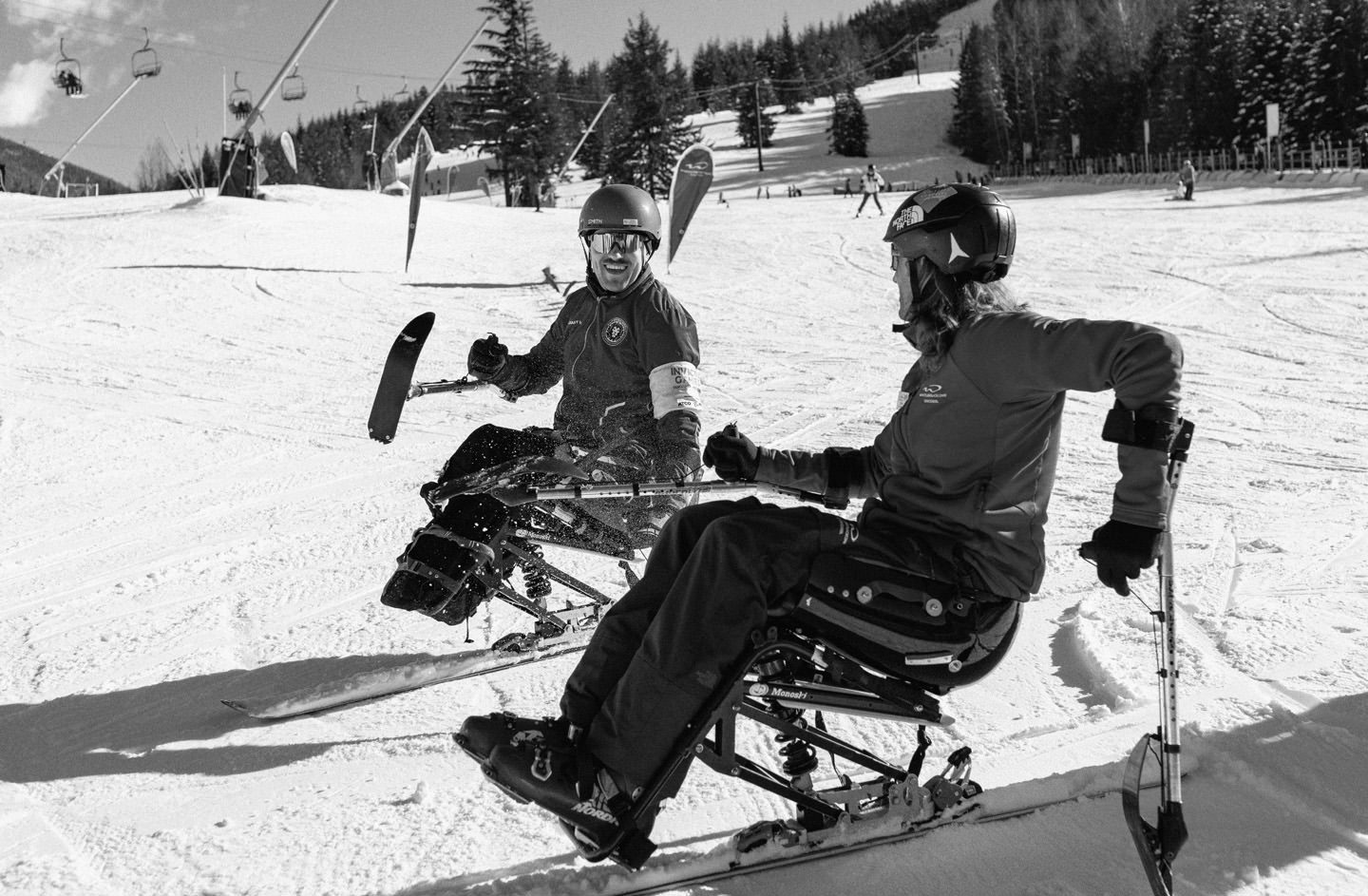When Prince Harry and Meghan, Duke and Duchess of Sussex, spent last year’s Valentine’s Day at Whistler Blackcomb, the tabloids took note. But what made the cover of the newspapers in the U.K.—Mirror, Sun, Daily Mail—was the duke on a sit-ski using outrigger poles.
“It went across most of the British tabloids,” says Sian Blyth, executive director of the Whistler Adaptive Sports Program, a registered charity that introduces people with a disability to sports. “Our head coach Adrià [Flor] and the sit-ski taking the patron of Invictus down the slopes.” The special equipment lets people with limited mobility experience the rush of alpine skiing and is just one of the tools provided by Whistler Adaptive that will be showcased during the 2025 Invictus Games from February 8 to 16 in Whistler and Vancouver—the first hybrid version of the games to include winter sports.
Blyth sees that image of the duke as pivotal to public perception of people with disabilities participating in sports and outdoor recreation. “You never know when that moment might transfer to somebody’s life,” she notes. “They meet someone with a disability or somebody within their world acquires a disability” and they’ll remember Harry on a sit-ski.
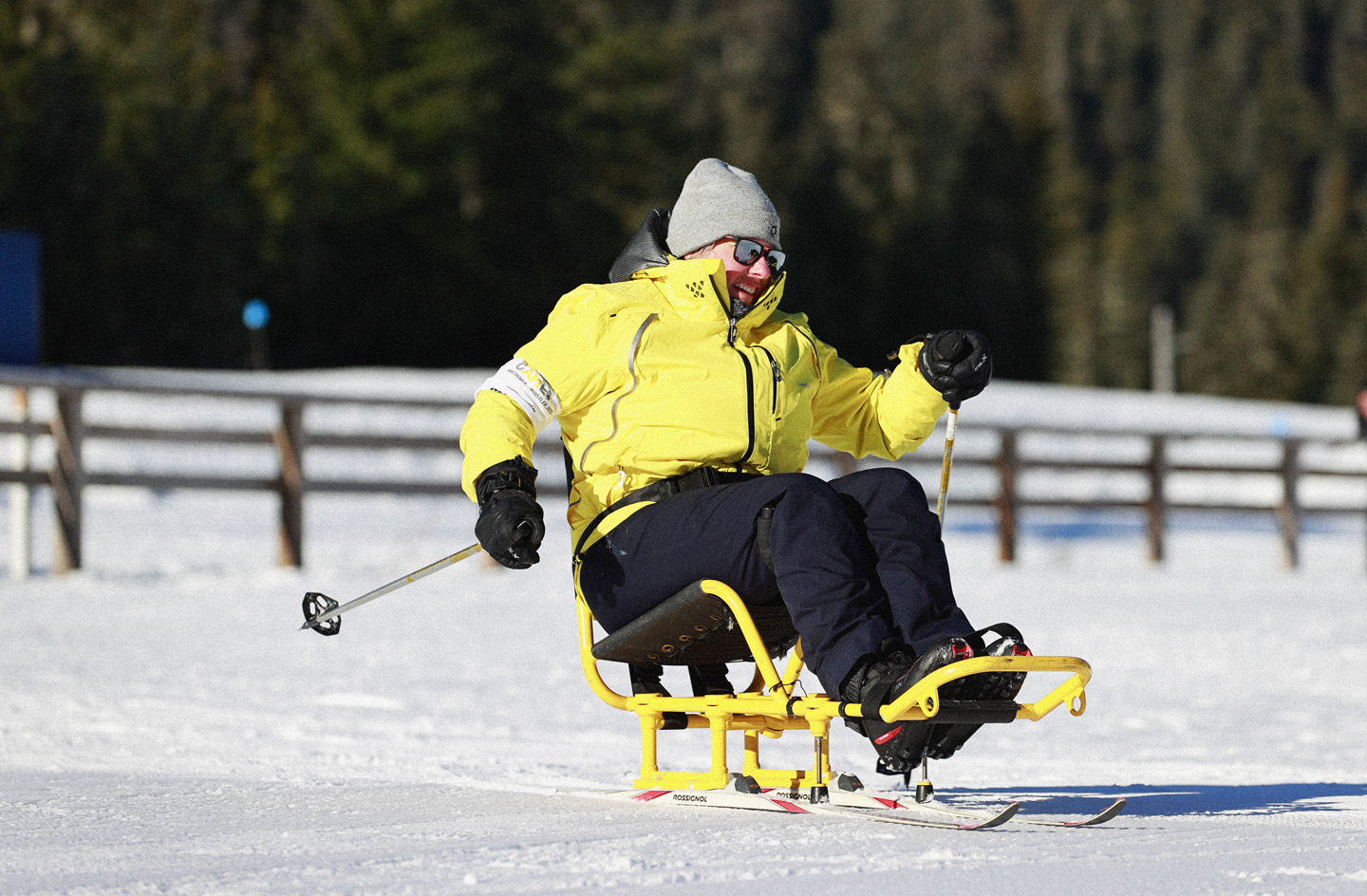
Nordic skiing on a sit-ski. Photo by Jeff Vinnick.
The prince founded the Invictus Games after his deployment in Afghanistan and watching a soldier’s coffin loaded for repatriation alongside three injured soldiers. When he later witnessed the healing power of sport at the U.S. Department of Defense Warrior Games, he was inspired to create an international version in 2014. Invictus is now celebrating its 10th anniversary—hosting up to 25 nations and more than 500 participants in 11 adaptive sports, from sitting volleyball to skeleton—while Whistler Adaptive has provided equipment and support to people with disabilities at Whistler Blackcomb for more than 25 years.
Blyth first experienced the positive effect outdoor recreation can have on people with disabilities while volunteering as a neurosurgical nurse for Back Up, a British charity that helps rehabilitate people with spinal cord injury. “It changed my life,” she says of seeing people regain confidence and independence in the outdoors. “Things that they were really struggling with, like heading from A to B in their chair in a small, inaccessible town in the U.K., suddenly didn’t seem as difficult, because they just got themselves up and down a hill in the Lake District and in and out of a kayak,” Blyth says. “The transfer to daily living skills is huge, and you can’t teach that in a rehab centre.”
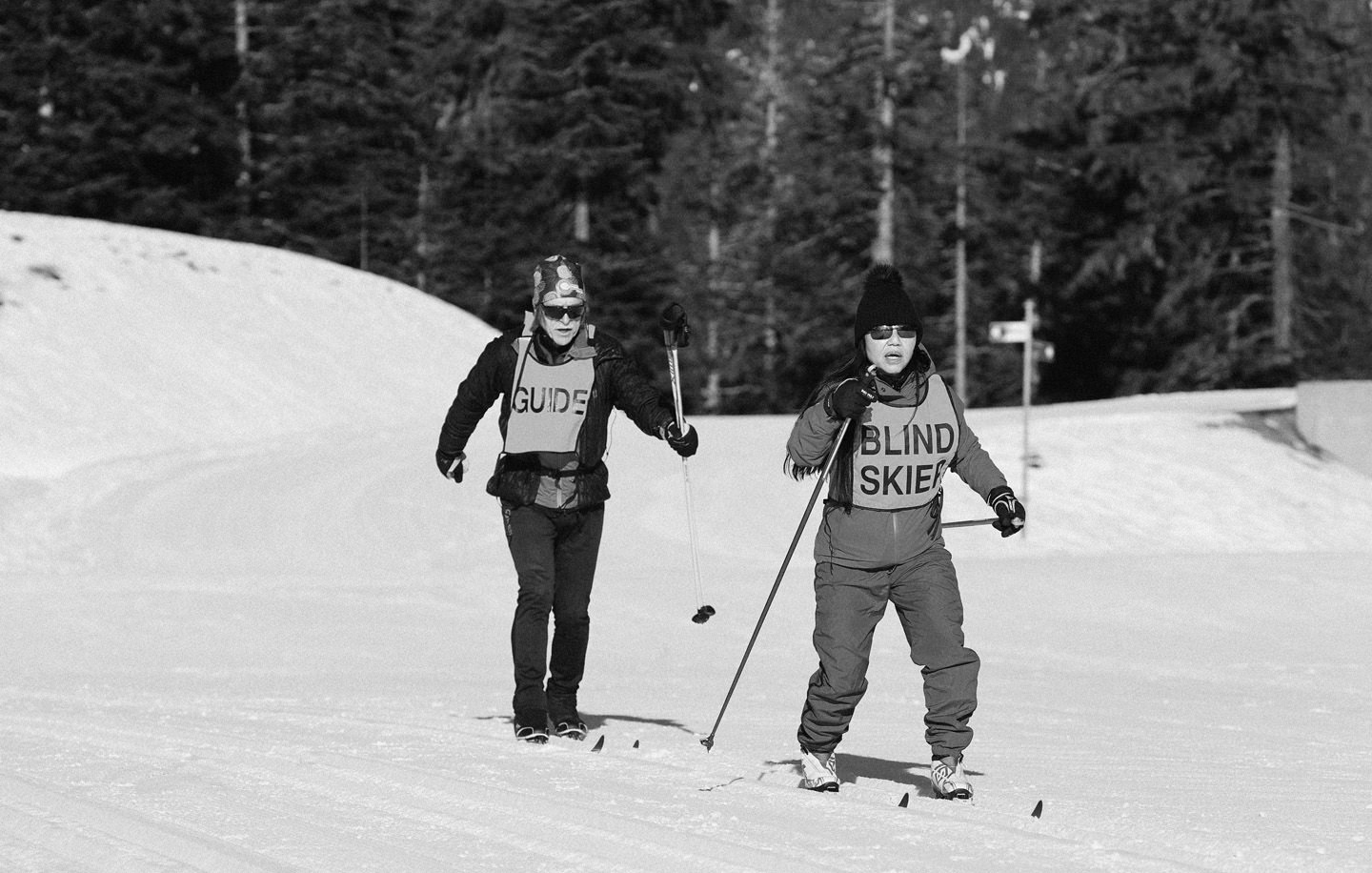
Nordic skiing with sighted guide. Photo by Jeff Vinnick.
And it’s not only people with obvious disabilities, in wheelchairs or visually impaired. Many have invisible disabilities, Blyth says. “The story that Invictus is really shining the spotlight on is that, on a daily basis, somebody is moving past us with an unseen disability. They have their own journey going on, and we just don’t see it.”
Alaina Mundy is one of those people. As an athletic soldier in the Canadian Armed Forces who had competed in Ironman triathlons, Mundy was shocked when she was diagnosed with multiple sclerosis. “It was very scary to have my body fail me all of a sudden,” she says. “I knew it was a career-ending diagnosis. And that was terrifying to me, because I wanted to be a colonel. I wanted to be a general. It was life shattering.”
Feeling isolated, she googled to see if there was anyone else like her—a woman in the military with MS. She found a 2018 Invictus Games competitor, Stacey Trottier-Mousseau, “an MS warrior, just like me,” Mundy says. Inspired, she sought to follow Trottier-Mousseau’s path and applied for the 2023 Invictus Games in Düsseldorf. She was one of 31 out of 600 applicants who made Team Canada, was named co-captain of the team, and won two gold medals in cycling.
But it’s not about the medals. “Invictus Games is a very personal, very physical, very emotional journey that veterans and current serving soldiers move through,” Mundy says. “The stitches in your soul change. When you see people you served with, who lost a limb and are swimming, you can’t help but tear up.”
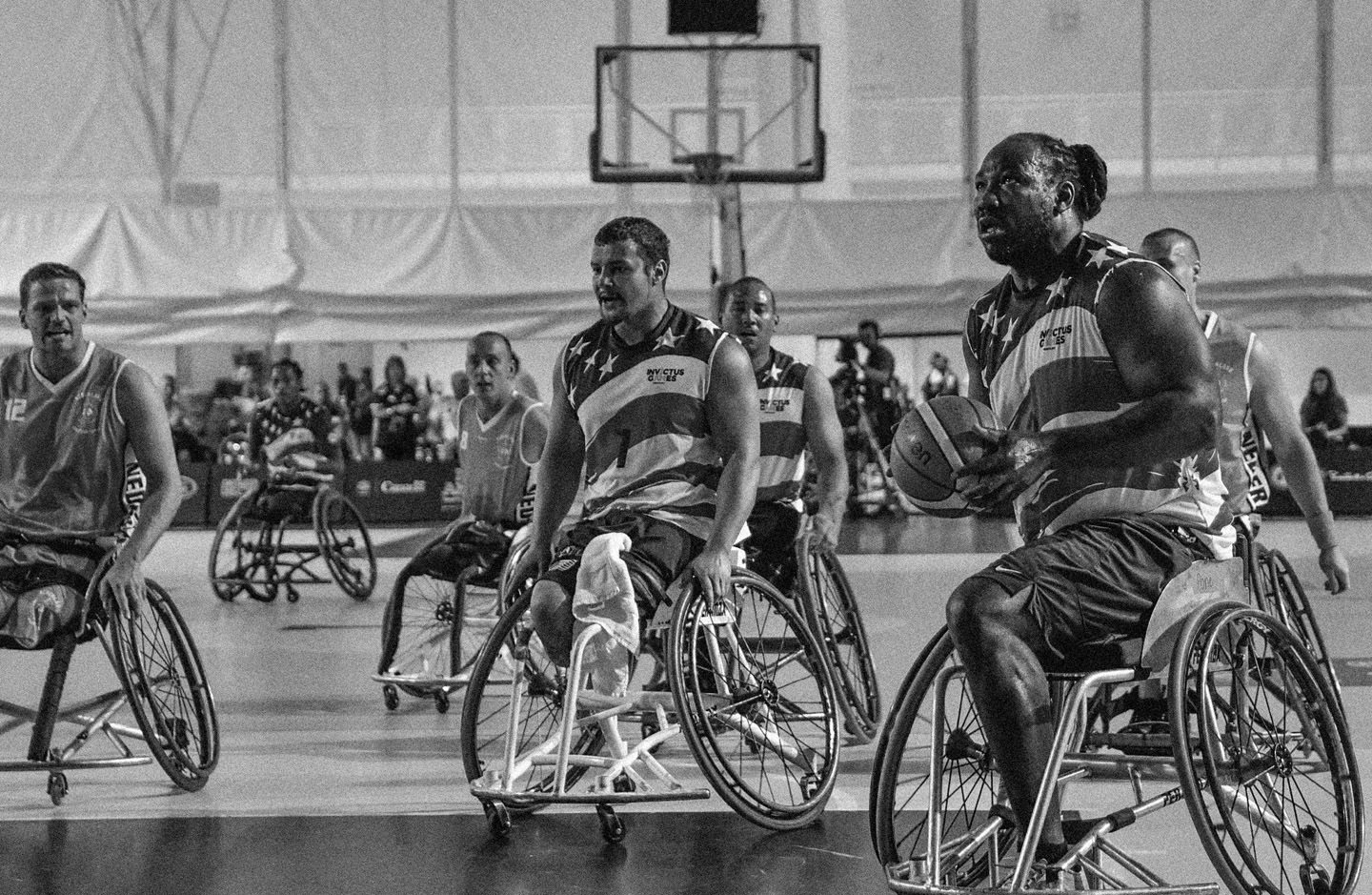
A wheelchair basketball match between Team USA and Team Netherlands. Photo courtesy of Invictus Games Toronto 2017.
Now on the board of directors for Invictus Games 2025 to support the next Team Canada—and all the athletes worldwide—Mundy lists the first names of veterans and past and present participants she “gets chills” thinking about: Levi, another MS warrior, and Matt, Natalie, Jess, Lealand.
Lealand Muller, now an accessibility consultant for Invictus, is an exemplar for how the games can turn lives around. Scott Moore, the 2025 Invictus Games CEO, shares how Muller introduced himself at a team meeting. “He said, ‘I joined the reserves when I was 16. I joined full time when I graduated high school, and a few years ago, I had a catastrophic accident and I knew immediately that I would never walk again, and I knew within months that I didn’t want to live this way.’” Muller fell into a depression and “literally didn’t want to live,” Moore says, but he regained his purpose training for Düsseldorf with Team Canada. “He didn’t win a single medal, but he got his life back … and he addressed everyone in the room: ‘I want to remind all of you that what you’re doing is saving lives.’”
Moore, who’s worked on 11 Olympic Games, emphasizes that message and distinction: “Olympic Games change lives. Invictus Games save lives.” And as co-captain of Team Canada in 2023, Mundy revved up Muller and all her teammates by telling them, “We’ve all climbed our own mountains to be here, physically and metaphorically,” whether that means missing a limb, using a wheelchair, navigating complex post-traumatic stress disorder (CPTSD), or simply renegotiating international travel and having to rely on other people.
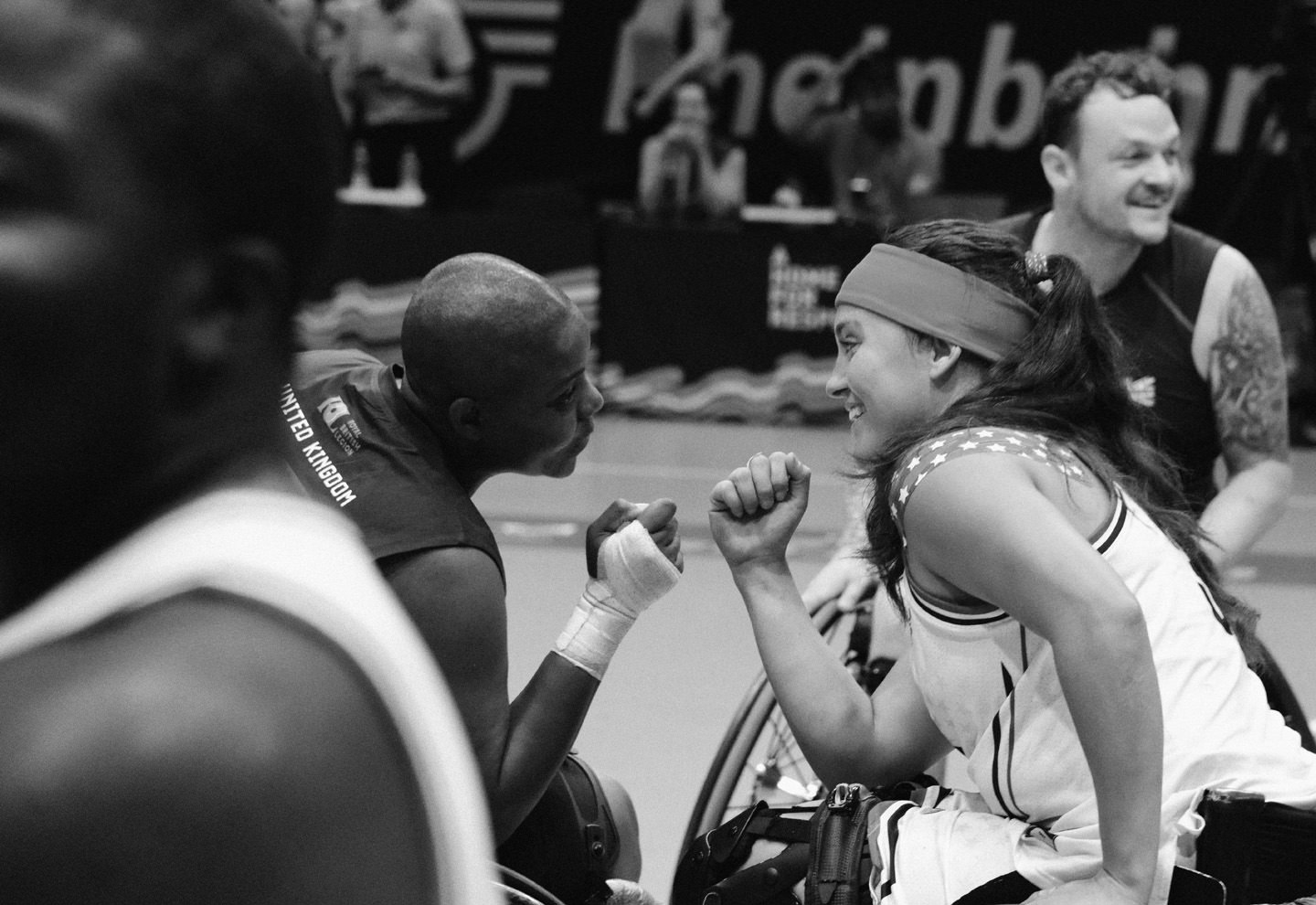
Wheelchair basketball athletes greeting each other at Invictus Games Düsseldorf 2023. Photo by Emily Langer.
As Moore says, “It’s not about the individual sports. It’s about seeing people get to the start line.” He wants spectators to cheer on the athletes at that start line and show appreciation for these warriors’ service and sacrifice. “One of the things that we committed to is a minimum of $5 million in legacy funds that will go towards veterans’ issues, homelessness, adaptive sport.”
He also mentions the Indigenous custom of blanketing. “I’d like to think that all our participants are going to be blanketed when they come into the opening ceremonies. They’re going to feel that legacy of gratitude and the enthusiasm of the people who are there to be a part of all this.”
Last February, during those One Year to Go celebrations when Harry tried the sit-ski, the four host First Nations—Liwat7úl (Líwat), xʷməθkʷəy̓əm (Musqueam), Sḵwx̱wú7mesh (Squamish), and səlilwətał (Tsleil-Waututh)—presented the Duke and Duchess of Sussex with handwoven blankets. And like that potent symbol of blanketing—honouring, strengthening, protecting—there’s great healing power in sport.
“Harry identified it perfectly,” Mundy says. “It’s better than any pill. It’s better than any drug. It’s better than any therapy. This is very true peer-support therapy.” Soldiers come out of the games changed, as does the average person with a disability after a day on the slopes with Whistler Adaptive. They realize they’re not alone, and “they can do this,” Blyth says.
The word invictus means unconquerable in Latin. It’s also the title of an 1875 poem by William Ernest Henley, who knew the sometimes dark and difficult journey of recovery after his leg was amputated. The poem ends: “I am the master of my fate / I am the captain of my soul.” That self-determination—“I AM”—has become the motto of the Invictus Games, where the competition is less about others and more about oneself.
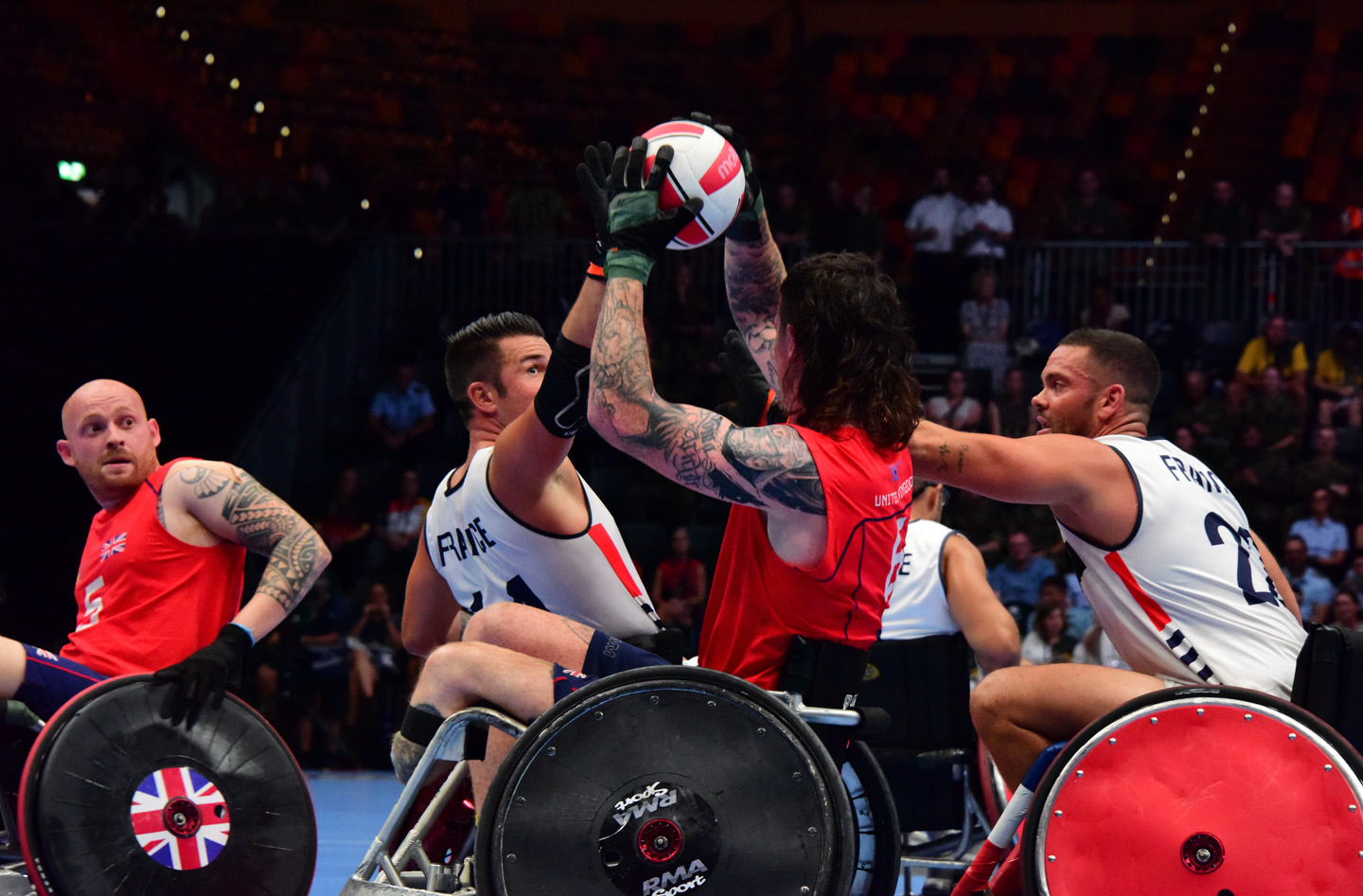
Wheelchair rugby between Team UK and Team France at Invictus Games Düsseldorf 2023. Photo by Emily Langer.
Read more from our Winter 2024 issue.

